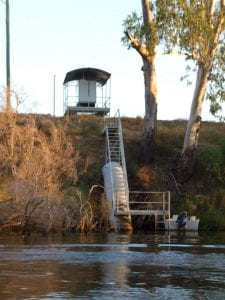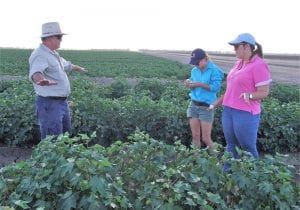Study in a time of scarcity
On a bright and sunny Sunday morning a small group of three students and myself left for Goondiwindi for the internal excursion into Cotton Production. We’ve done this now for over 27 years as a way to expose on-campus students to a woody, indeterminate and potentially perennial that we grow as an annual crop, because nothing else in their studies is quite like it. The cohort was small, not due to a lack of enrollments, but an issue with a timetable error and students not reading emails prior to term starting, but we went ahead. As well as a scarcity of students we were also heading to a scarcity of cotton fields and water.
Tackling the challenges from a different perspective
In a normal year we’d introduce the students to the crop, its physiology, basic management, harvest and lint processing, which takes us from field to shipment. Normally water management is a large part of several of these concepts, but in a drought the focus shifts to crop management with either little or no water.
We saw mostly dry land crops, but there were a few that had been managed for the available water on the farm. Some had done this by adjusting the row configuration so there were fewer plants to water. Others had gambled on in-crop rain and were now faced with dilemmas as to whether to stop the crop and pick what little cotton there was. Only one farm had a fully irrigated crop in the ground, but they had grown no cotton last year due to their rotation and were using stored water to water only one field on a farm that would normally have several.

This device monitors water onto the farm from the river. It is checked monthly and you may even see the tamper proof tag on the left.
Drought affects farms and communities
So the management discussions and decisions focused on how you approach farming with little water, but that’s only part of any story. The first night at dinner we noted how quiet the pub was. The bar staff told us it has been that way for a couple of months now. The following day at the gin we were told that only one set of gin stands would be running this year, offering employment to half the local people they would normally employ through the season. No rain, less crops, less employment and less revenue returns to the local rural communities. A drought does not just pick on farmers, it hits whole communities.
It is OK to still have fun? Risk and benefit analysis said yes.
So we were educating under difficult conditions, but these occur and it seems just as important to have students considering the bad times as well as the good. In addition, with a small group other possibilities sometimes present themselves.
Many years ago I used to take students to a national park in France. The University insurers did not cover us for horse drawn or non-motored boat travel. Now if you go to see the bison of Lozere you do it by horse drawn buggy and if you want to see the flood damage, troglodyte caves and beavers of the Tarn gorge, you need to be on the water in an inflatable raft. Sure there is a risk and you can assess that, but many years ago I was introduced to the concept of benefit analysis and it soon becomes justified that the learning outcomes, conducted under safe supervision, are highly likely to outweigh the risk.
Now whilst there is no water being pumped from the Macintyre, it does not mean it is empty between the weirs near Goondiwindi. So in order to see the unused irrigation pumps and truly appreciate their construction we took to the water, the benefits far outweighing the risks. It just happened that we had several water skiers in the group and so we did a little team bonding on route to the various pumps.

A water pump on the Macintyre. Pumping by those with a license is normally permitted during times of high flow. On average here that is for 21 days a year. There have been two such days in the last three years.

Taking to the water to see river pumps. Skiing helped to take our minds off the issues of the day and build team skills.
We are in a drought
We’d traveled up to Goondiwindi through Bingara, Gilgai and Yetmen. The evidence of the Tingha fire all too vivid as we drove up and the lack of crops north of Inverell was quite startling. I’ve made this trip numerous times and the lack of crops was striking. On the way back we decided to travel via North Star and Warialda. The golden triangle it may still be, but stubble and soil gave rise to the description for now and not sunflower or sorghum that would be more normal for this time of year.
We saw one farmer planting and we hope that the rains they will need for success find them and many of the other farmers we visited on this excursion.
If we learned nothing else from this trip it is that drought is cruel, uncaring and becoming all too common. The impacts go way beyond the farm and impact most aspects of life in our rural communities, for whom we hope the rains will come soon and be sufficient that the year ahead will be one of promise.




Recent Comments